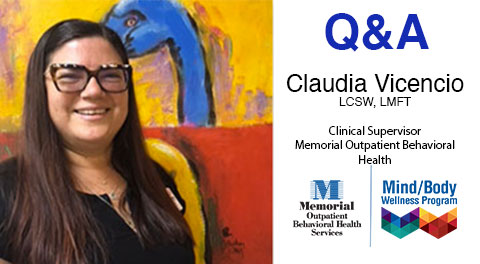Claudia
October 31, 2017

How long have you worked at Memorial?
I started at Memorial in 2003 when I graduated from Barry University with a master’s degree in social work. I left for about two years and then got recruited back into the system in 2009. So I have been here eight years now. It was my dream to work for the health system ever since I had my daughter at Memorial in 1996. I was so impressed by the staff and the care I received.
Could you briefly describe what you do in your role there at Behavioral Health?
I am the clinical supervisor for Outpatient Behavioral Health, which is dedicated to providing comprehensive behavioral health services to the community. Our center offers a wide range of services to people with serious mental illness, psychiatric issues and substance abuse disorders. When I say comprehensive I mean our program runs the gamut – from providing peer support services through our Rebel’s Drop-in Center to having a co-located primary care clinic on site – the Mind Body Wellness Clinic. We also have a psychiatric medication clinic and a variety of clinical programming, including intensive outpatient programs, which is what I oversee. I supervise a team of 16 therapists. I also co-developed and co-run, along with Alberto Augsten, PharmD, targeted multidisciplinary programs, including the Mothers in Recovery program and the Medication-Assisted Treatment Program.
 Can you tell me more about Mothers in Recovery?
Can you tell me more about Mothers in Recovery?
Back in 2014 there were no detox facilities for pregnant women, so when a pregnant woman wanted to stop using drugs, there was nowhere (at least not in Broward County) for her to detox safely. Memorial was approached by the Broward Behavioral Health Coalition, an organization that oversees all of the federal and state funding that comes into the county for substance abuse and mental health services. They asked Memorial to develop a hospital-based program to treat this population and that we do so in partnership with Susan B. Anthony Recovery Center, which is a residential program for pregnant women and women with young children. The idea was to create a program based on pharmacological principles integrated with social work framework – so it was not just about detoxing someone; it was about creating something that provided a lot of structured support and used evidence-based practices to treat addiction in pregnancy. We work with the baby and the mother; in other words, the baby is being monitored while the mom is being cared for. We make sure the care is integrated – obstetrics, maternal-fetal medicine, psychiatry – all work together with clinical pharmacy and social work to keep the inpatient length of stay short, but also providing the safest and most effective treatment for mom and baby.
Has the program been successful?
The program started in May of 2015 and it has been really successful with some great outcomes. The goal of the program is to reduce the rates of neonatal abstinence syndrome. If we are able to effectively treat addiction in pregnancy, we will see an increase in babies who are born drug-free, which is the whole purpose of the program. So far, we have a 90% rate of success with babies born to program mothers healthy and drug-free.
Are there any other noteworthy programs you’d like to mention?
Yes. In May of this year Gov. Rick Scott officially declared the opioid epidemic a public health emergency for Florida. As a result, some funding was released to develop programs to treat opioid addiction, and from our two years-plus experience with Mothers in Recovery (MIR), we know how to use medication-assisted treatment (using medication that helps treat addiction) to achieve the best treatment outcomes in this population. Taking our expertise with MIR, Dr. Augsten and I developed the Medication-Assisted Treatment (MAT) Program. The goal of MAT is to help the person achieve recovery from addiction through the use of medication to treat opioid use disorders coupled with behavioral therapy. Like with MIR, the MAT program is a team effort and is successful because of the hard work of an amazing group of people, from psychiatrists, clinical pharmacy specialists, social workers, nurses and peer support specialists. The MAT program is one way our healthcare system is addressing the opioid crisis, and we treat individuals from all walks of life. The program has been running since June of this year and the results have been incredible – people who were repeatedly presenting to our emergency department after an opioid overdose are now in treatment, putting their lives back together, finding jobs, reuniting with their families – their lives have completely changed for the better because of our MAT program.
What do you like most about working for Memorial Healthcare System?
Working for the system is truly a privilege because we are part of an organization that lives by its principles, and I believe in work that is fueled by values and helping others. It’s inspiring to go to work each day for a system dedicated to putting the patient and family first.
Is there something that you would like to share with fellow coworkers that they might not know about you?
Most people who know me know that I am in the process of finishing my doctorate in social work and as November 8th I will be ABD (all but dissertation) and, fingers crossed, I will finish in December. The stress is incredible but I have learned so much along the way – how to be non-judgmental and curious and allowing myself to look at an issue from a variety of angles, that has been the real payout. But I will also take great pleasure in making everybody call me doctor once I’m done (just kidding).
ER Opioid Crisis

